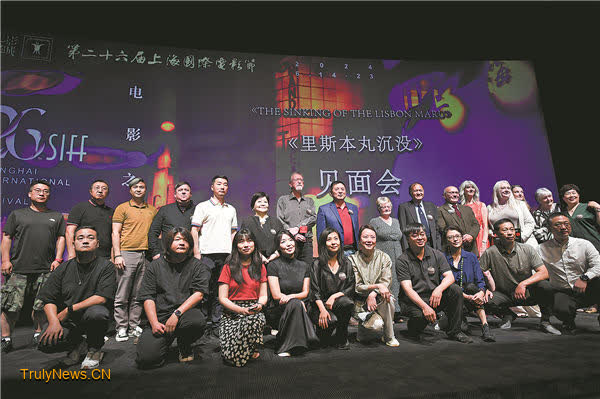
The Chinese-made documentary The Sinking of the Lisbon Maru celebrated its world premiere on June 14 as the first film of the 26th Shanghai International Film Festival.
Directed and produced by Fang Li, the film spotlights a human story between British prisoners of war and Chinese fishermen during World War II (1939-45).
The Lisbon Maru was a freight vessel that was converted into an armed troop carrier by the Japanese Army. In October 1942, it was carrying more than 1,800 British POWs from Hong Kong to Japan when it was torpedoed by the US navy, sinking off the Zhoushan Islands in East China’s Zhejiang province.
As the ship sunk, nearby fishermen carried out a great humanitarian rescue, saving 384 prisoners from drowning.
Even though survivors and rescuers in the Lisbon Maru incident have passed away, the kindness of the Chinese fishermen has never been forgotten. Their stories have been passed on from generation to generation, both in China and in England.
Tony Benham, a Hong Kong-based British historian, wrote the book The Sinking of the Lisbon Maru: Britain’s Forgotten War Tragedy, which provided a solid foundation for the documentary.
“When I started writing that book more than 20 years ago, nobody was interested apart from the families themselves and the survivors. I found it was a forgotten story. I would never have dreamed that this journey would take me to Shanghai 20 years later. The small book I wrote … has turned into one of the most emotionally draining documentaries I’ve seen in my life,” says Benham after the film’s premiere in Shanghai.
This unknown story shocked Fang as well, making him instinctively seek out survivor families and dig into the story’s details.
Fang, also a veteran marine technology expert and geophysicist, spent years studying the incident and decided to make the documentary after successfully locating the sunken ship in 2016.
“There are so many touching stories about love, family affection, friendship among comrades, and more. It was a disaster and carnage that happened at our doorstep and a heroic feat by the most ordinary of Chinese people … of course, the story should be told by us Chinese,” said Fang after the premiere.
Brian Finch, who was commissioned into the UK’s Middlesex Regiment in 1960 and served with one of the survivors of the Lisbon Maru, has helped Fang in contacting soldiers’ relatives for the documentary.
He told China Daily in an interview earlier this year: “Everyone who knows about the story remembers it and the relatives are very keen to participate, but the vast number of people in the United Kingdom do not know about it. We need to give the story maximum publicity within the UK and internationally to get the story widely known.”
This echoes Fang’s expectations. “I hope everyone can remember Lisbon Maru as they remember the Titanic. Also, we hope the brave and kind acts of the Chinese people during the war will be remembered,” says Fang.